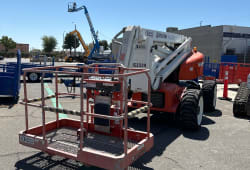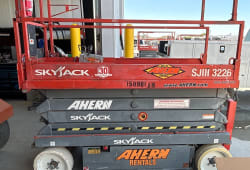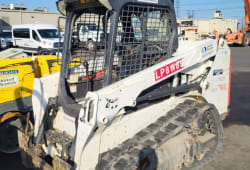Exploring the Versatility of Vacuum Trucks: Essential Heavy Machinery for Various Applications
4 Min read
)
March 31, 2024
Vacuum trucks, also known as vacuum tankers or vacuum tank trucks, are indispensable heavy machinery used across a multitude of industries for various tasks. These versatile vehicles are equipped with powerful vacuum pumps and large storage tanks, enabling them to suction and transport liquids, solids, sludge, and hazardous materials efficiently. In this article, we'll delve into the features, benefits, and applications of vacuum trucks, shedding light on why they are crucial assets for businesses and municipalities worldwide.
Understanding Vacuum Trucks:
Vacuum trucks are specialized vehicles designed to handle the collection, transportation, and disposal of a wide range of materials, including liquids, sludge, sewage, and hazardous waste. They feature a vacuum system comprising a high-powered pump and a large storage tank, along with hoses and suction nozzles for extracting materials from underground or above-ground sources. Vacuum trucks come in various configurations, including wet vacuum trucks, dry vacuum trucks, and combination units capable of handling both wet and dry materials.
Key Features of Vacuum Trucks:
Powerful Vacuum System: Vacuum trucks are equipped with high-capacity vacuum pumps capable of generating strong suction forces to extract liquids, sludge, and debris from various sources.
Large Storage Tank: The storage tank of a vacuum truck is designed to hold a significant volume of materials, allowing for efficient transportation and disposal without frequent emptying.
Specialized Attachments: Vacuum trucks are equipped with specialized attachments such as hoses, suction wands, and vacuum booms to facilitate the collection of materials from hard-to-reach or confined spaces.
Pressure Washing Capability: Many vacuum trucks are equipped with pressure washing systems for cleaning surfaces and equipment, making them versatile assets for industrial cleaning applications.
Safety Features: Vacuum trucks are equipped with safety features such as spill containment systems, emergency shut-off valves, and explosion-proof components to mitigate risks associated with handling hazardous materials.
Applications of Vacuum Trucks:
Sewer and Septic System Maintenance: Municipalities and utility companies use vacuum trucks for cleaning and maintaining sewer lines, septic tanks, and lift stations, removing accumulated sludge and debris to prevent blockages and backups.
Environmental Cleanup: Vacuum trucks are deployed for environmental cleanup and remediation projects, including spills, leaks, and contaminated sites, where they extract and transport hazardous materials safely and efficiently.
Industrial Cleaning: Industrial facilities utilize vacuum trucks for cleaning tanks, vessels, pipelines, and machinery, removing residues, sludge, and waste materials to maintain operational efficiency and compliance with environmental regulations.
Construction and Excavation: Vacuum trucks are used in construction and excavation projects to remove excess water, mud, and debris from excavation sites, trenches, and underground utilities, facilitating safe and efficient digging operations.
Oil and Gas Industry: In the oil and gas industry, vacuum trucks are employed for various tasks, including removing drilling mud, cleaning storage tanks, and transporting drilling waste, contributing to operational efficiency and environmental compliance.
Buying and Reselling Vacuum Trucks:
For those considering purchasing or reselling a vacuum truck, here are some important considerations:
Type and Capacity: Determine the type and capacity of the vacuum truck that best suits your needs, considering factors such as material type, volume, and transportation distance.
Condition: Inspect the vacuum truck thoroughly and assess its condition, including the vacuum system, storage tank, hoses, and attachments, to ensure it functions properly.
Maintenance History: Review the maintenance records to gauge how well the vacuum truck has been maintained and anticipate any potential maintenance or repair needs.
Market Value: Research the market value of similar vacuum trucks to determine a fair price for buying or selling.
Documentation: Ensure all necessary documentation, including ownership papers, maintenance records, and legal certifications, is in order to facilitate a smooth transaction.
Conclusion:
Vacuum trucks are indispensable assets for a wide range of industries, offering efficient and versatile solutions for the collection, transportation, and disposal of various materials. Whether you're in municipal services, environmental cleanup, construction, or industrial maintenance, investing in a vacuum truck can enhance your operational capabilities, streamline your processes, and contribute to overall efficiency and safety. By understanding the features, applications, and considerations involved in buying or reselling vacuum trucks, you can make informed decisions and maximize the effectiveness of these essential heavy machinery assets.

Caleb Woods is an experienced content specialist and an editor at Boom & Bucket, blending his journalism background with expertise in the heavy equipment industry. He delivers engaging, informative content to help professionals stay informed and make smarter decisions in the machinery market.











